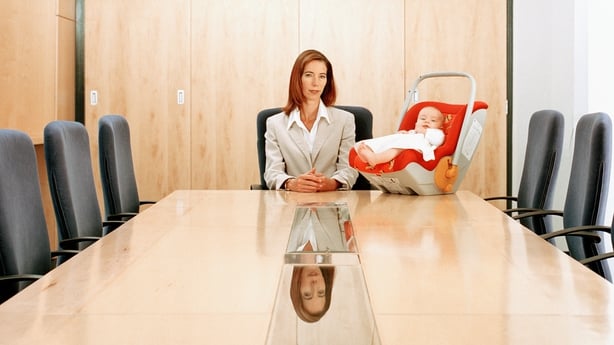What is the motherhood penalty?

‘Working mothers’ – what a misnomer!
Every mother works, and those employed outside of the home essentially have two jobs.
And yet, mothers face additional obstacles in the workplace when it comes to career development, career advancement, salary and pension gaps – better known as ‘the motherhood penalty’.
But as we celebrate Mother’s Day, what are the challenges mothers face as they strive to balance their professional and family lives, and what supports are needed to help mothers find that balance?
Maternity Leave
Women in Ireland get some of the longest maternity leave periods in Europe, but are also some of the lowest-paid.
New mothers have the right to take 26 weeks maternity leave from full-time, part-time or casual employment, no matter how long they have been working for an employer.
The vast majority of women qualify for maternity benefit of €274 each week over this time, and employers can voluntarily top this payment up.
However, according to the latest figures from the CSO, almost one-third of women that started maternity leave in 2021 did not receive any payment from their employer during their leave period.
Mothers also have the right to take up to 16 weeks additional unpaid maternity leave.
Ireland’s maternity leave entitlement of up to 42 weeks is almost double the EU average, but while it may seem generous, it does not compare favourably with other countries when it comes to paid leave, despite increases in recent years.
New mothers appreciate the support of their partners or spouses after giving birth and to facilitate that, paternity benefit was introduced in 2016.
But while leave for new fathers has increased and expanded in recent years, the uptake remains low.
In fact, half of fathers entitled to paternity benefit do not avail of it. Figures from the CSO show that in 2020, just over 50% of fathers in employment did not claim paternity benefit.
There are sometimes attitudinal barriers with men reporting that they don’t feel supported or encouraged by their employer to take this period of leave.
This situation is problematic for all, according to Kara McGann, Head of Social Policy at employers group Ibec.
“Work-family tension impacts both genders, women lose out on opportunities, men lose out on feeling accepted as caregivers, companies lose out on talent,” she said.
She added that debunking gender stereotypes will enable more men and women to take an active role both in and outside the workplace, “thus normalising the situation and removing the penalty for mothers.”
Returning to work
The weeks leading up to returning to work are an anxious time for mothers.
Lockton Ireland commissioned a survey last year which found that 70% of employees believe that Irish employers should offer additional supports such as career coaching and additional training for women returning to the workplace following maternity leave.
For example, rapid changes in technology and industry practices can make it daunting for returning women to catch up.
Granted, more women than men would like to see employers step up with regards to providing supports for women, however, a significant six in ten men also acknowledged the importance of such support.
Ray McKenna, partner with Lockton Ireland said this points to a shared recognition of the challenges women face when returning to work and the importance of diversity, equity, and inclusion objectives in workplace strategy formation.
The biggest barrier to mothers returning to the workforce in Ireland has always been the cost and availability of childcare.

Childcare
Childcare is the “key difficulty” facing parents, and mothers in particular, according to professional development body CIPD Ireland.
“While better accommodations for working mothers would be of benefit in the workplace, we know from CIPD members that a key difficulty remains around childcare,” said CIPD Director, Mary Connaughton.
“The lack of access to affordable childcare, and the way government supports often do not allow for flexible care arrangements remain a disincentive to mothers participating in the labour force.”
Mr McKenna, from Lockton Ireland, said the steep cost of childcare, which has in many cases become unaffordable and in certain areas inaccessible to many families “means that often the only option is for one parent to give up work and stay at home – and in the main, it’s women who do this”.
Last month, Chartered Accountants Ireland outlined a plan aimed at improving childcare policy for the benefit of both providers and parents.
It proposed a series of steps which it said could leave working parents up to €4,500 a year better off and free up vital working capacity in the economy.
‘Supporting Working Parents – The case for better childcare policy’, sets out the economic arguments for improved childcare provision as well as highlighting the experiences of working parents seeking childcare.
Among the measures proposed are the expediting of plans to enable parents who use childminders that are not registered with Tusla, to access the National Childcare Scheme.
Flexibility
Many workplaces still need to provide more part-time and flexible ways of working to support working parents, according to CIPD Ireland.
“While we have seen lots of progress, many roles could be more creatively handled to increase access to part-time and flexible opportunities,” said Ms Connaughton.
During the pandemic, the International Monetary Fund confirmed what many women already knew – mothers shouldered much of the pain and suffered an outsized economic impact.
In “the world of work, women with young children have been among the biggest casualties of the economic lockdowns,” IMF chief Kristalina Georgieva said at the time.
The study by IMF economists, which looked at the experiences of mothers in the US, Britain and Spain, showed why it is “crucial” to provide added support to mothers.
While parents became their children’s teachers and had to grapple with homeschooling, the pandemic also brought remote and hybrid working. The option to work remotely at home has been a game changer for mothers especially.

However, there has been a dramatic shift back to office-based working among global mid-market firms in the past 12 months, according to research from Grant Thornton. 47% of businesses are now primarily office-based (compared to 36% last year), and 45% are hybrid (compared to 53% last year).
Partner and Chair of Grant Thornton Ireland Sinead Donovan said this is potentially being driven by male CEOs – 50% of businesses with a male CEO are predominantly office-based, compared to 40% of female-led businesses.
“Businesses in which workers are primarily office-based are the only ones where the percentage of women in senior management roles drops below the global benchmark,” Ms Donovan said. “The pathway to parity is the ability to work flexibly.”
A step down that pathway was taken by the Government last Thursday when the right to request remote working was brought into operation.
The right to request flexible working arrangements for parents also commenced.
The code of practice, drawn up by the Workplace Relations Commission, has been approved and published, forming part of the Work Life Balance Act which was enacted in April 2023.
Minister Roderic O’Gorman said, “Remote working became a new norm for many employers and employees in the wake of Covid-19 and it is clear it is here to stay.”
“This Government committed to facilitating and supporting remote working, to reduce our time commuting and to enable families to spend more time together,” he added.
Linda Hynes, Partner at employment law firm Lewis Silkin, explained what it means for parents; Employees with a child under 12 years old, or under 16 years old if the child has a disability or illness can make a flexible working request to provide care to the child.
“These new rights will bring greater opportunities for those with parental and caring responsibilities to work with their employers to agree arrangements that improve their opportunities to spend time with their family members while balancing their working week.”
The Motherhood Penalty
Mothers often face additional impediments in the workplace by virtue of the fact that they have caregiving responsibilities at home. Global research has even coined a phrase for it: the motherhood penalty.
It refers to the obstacles faced by mothers when it comes to career development, career advancement opportunities and salary and pension gaps.
Mr McKenna from Lockton Ireland said the mother hood penalty puts women at a disadvantage because of “gaps in their CV, skill erosion, and the perception, that they may be less committed to the job”.
“Pregnant women and mothers are assumed to be less committed to their careers, and every time they leave the office or ask for any flexibility, that commitment is further called into question.” – Anne-Marie Slaughter, author of Unfinished Business: Women Men Work Family.
When a man is seen in a caregiving role, his reputation is boosted and it even elicits warmth from others, but a woman’s role as a caregiver can trigger doubt about her capabilities, according to Ibec’s Ms McGann.
In many cases, women with children were viewed as less competent and less committed than women without children and men, including fathers.
“This resulted in women meeting the same obstacles, often early in their careers, and when they reduced work hours or stepped back to care for children the result was long lasting, impacting salary and promotions for many years and yielding a significant gender gap at the top of most professions.”
Pensions
After contributing to society and the economy, having worked ‘double shifts’ in the home and the workplace, you would think that mothers could enjoy retirement with a healthy pension pot.
That is not the case. The gender pension gap is a sticking point that continues to prevent equality amongst Irish women and men.
According to research by the ESRI, the pension pots of Irish men aged 60 to 65 are on average almost twice as high as those of Irish women of the same age, with Ireland’s pension gap standing at 35%.
“Given that women in Ireland typically live longer than men, and that there has been a substantial increase in recent years in the number of female retirees, the gender pension gap is hugely concerning,” said Karen O’Flaherty, Senior Propositions Executive in Royal London Ireland.
Interrupted career paths when women step back from work to look after children, have a major bearing on pension planning, according to pension specialists Lockton Ireland.
“Time taken out of the workforce to care for children is also time lost paying into a pension – as well as receiving any employer top-ups to that pension. The fact that women often earn less than men also eats into their ability to make meaningful pension savings,” Mr McKenna of Lockton Ireland said.
Part-time work is often taken up by women in their attempt to juggle their childcare responsibilities with work. This also eats into their ability to save for a pension.
“There are significantly more women than men in part-time employment and this also contributes to the gender pension gap. Women in part-time roles who are juggling childcare responsibilities with work should also be encouraged to join their company’s pension scheme.
“Many part-time workers don’t realise they have the same rights when it comes to pensions as full-timers, depending on the hours they work,” he said.
Ms O’Flaherty said it is imperative that that the gender pension gap is addressed – “otherwise many women could struggle to make ends meet in retirement, find it difficult to fund medical care when they most need it, or simply find their lifestyle in retirement is not as comfortable as they had hoped”.




